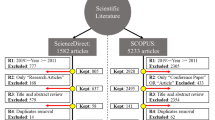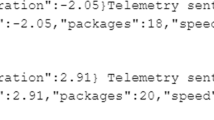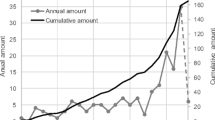Abstract
Scheduling automotive part manufacturing is more arduous and complex. Getting an optimum schedule for automotive part manufacturing is a very back-breaker task. In today’s scenario, every industry and research organization need an energy-efficient system to cope up with the global environment. In the present work, we proposed energy-efficient fuzzy scheduling system for crankcase manufacturing. This study consists of the development of an energy-efficient fuzzy inference system, and its results are validated by a fuzzy set approach. Fuzzy logic can consider multiple criteria and can deal with uncertainty also. This scheduling system will help for identifying job priorities and select the best alternative route with multi-criteria scheduling through fuzzy logic. Three inputs are selected for both job priorities and route selection. Inputs are further divided into three ranges for developing 27 rules in the fuzzy reasoning tool. Fuzzy logic provides a decision by a combination of the rules for selecting job priorities and route selection. This study is very useful for all automotive industry as well as research organizations.




Similar content being viewed by others
References
G. Mouzon, M.B. Yildirim, J. Twomey, Operational methods for minimization of energy consumption of manufacturing equipment. Int. J. Prod. Res. 45(18–19), 4247–4271 (2007)
D. Tang, M. Dai, M.A. Salido, A. Giret, Energy-efficient dynamic scheduling for a flexible flow shop using an improved particle swarm optimization. Comput. Ind. 81, 82–95 (2016)
M. Mori, M. Fujishima, Y. Inamasu, Y. Oda, A study on energy efficiency improvement for machine tools. CIRP Ann.-Manuf. Technol. 60(1), 145–148 (2011)
S. Kara, S. Manmek, C. Herrmann, Global manufacturing and the embodied energy of products. CIRP Ann.-Manuf. Technol. 59(1), 29–32 (2010)
C. Herrmann, S. Thiede, S. Kara, J. Hesselbach, Energy oriented simulation of manufacturing systems-concept and application. CIRP Ann. - Manuf. Technol. 60(1), 45–48 (2011)
J. Bonvoisin, S. Thiede, D. Brissaud, C. Herrmann, An implemented framework to estimate manufacturing-related energy consumption in product design. Int. J. Comput. Integr. Manuf. 26(9), 866–880 (2013)
X. Wang, Y. Dai, Z. Jia, Energy-efficient on/off control in serial production lines with Bernoulli machines. Flex. Serv. Manuf. J. (2022). https://doi.org/10.1007/s10696-022-09481-8
E.A. Abdelaziz, R. Saidur, S. Mekhilef, A review on energy saving strategies in industrial sector. Renew. Sustain. Energy Rev. 15(1), 150–168 (2011)
C. Gahm, F. Denz, M. Dirr, A. Tuma, Energy-efficient scheduling in manufacturing companies: a review and research framework. Eur. J. Oper. Res. 248(3), 744–757 (2016)
Y. Li, Y. He, Y. Wang, P. Yan, X. Liu, A framework for characterising energy consumption of machining manufacturing systems. Int. J. Prod. Res. 52(2), 314–325 (2014)
J. Wang, F. Qiao, F. Zhao, J.W. Sutherland, Batch scheduling for minimal energy consumption and tardiness under uncertainties: a heat treatment application. CIRP Ann. Manuf. Technol. 65(1), 17–20 (2016)
S.A. Mansouri, E. Aktas, U. Besikci, Green scheduling of a two-machine flowshop: trade-off between makespan and energy consumption. Eur. J. Oper. Res. 000, 1–17 (2015)
M.M. Aghelinejad, Y. Ouazene, A. Yalaoui, Production scheduling optimisation with machine state and time-dependent energy costs. Int. J. Prod. Res. 56(16), 5558–5575 (2018)
J. Yan, L. Li, F. Zhao, F. Zhang, Q. Zhao, A multi-level optimization approach for energy-efficient flexible flow shop scheduling. J. Clean. Prod. 137, 1543–1552 (2016)
G. May, B. Stahl, M. Taisch, V. Prabhu, Multi-objective genetic algorithm for energy-efficient job shop scheduling. Int. J. Prod. Res. 53(23), 7071–7089 (2015)
H. Nanvala, Use of fuzzy logic approaches in scheduling of FMS: a review. Int. J. Comput. Sci. Eng. 3(4), 1734–1739 (2011)
K.T. Fang, B.M.T. Lin, Parallel-machine scheduling to minimize tardiness penalty and power cost. Comput. Ind. Eng. 64(1), 224–234 (2013)
C.A. Garcia-Santiago, J. Del Ser, C. Upton, F. Quilligan, S. Gil-Lopez, S. Salcedo-Sanz, A random-key encoded harmony search approach for energy-efficient production scheduling with shared resources. Eng. Optim. 47(11), 1481–1496 (2015)
M.H. Fazel Zarandi, F. Dorry, A hybrid fuzzy PSO algorithm for solving steelmaking-continuous casting scheduling problem. Int. J. Fuzzy Syst. 20, 219–235 (2018)
C. Lu, L. Gao, X. Li, Q. Pan, Q. Wang, Energy-efficient permutation flow shop scheduling problem using a hybrid multi-objective backtracking search algorithm. J. Clean. Prod. 144, 228–238 (2017)
Y. Liu, N. Lohse, S. Petrovic, N. Gindy, An investigation into minimising total energy consumption, total energy cost and total tardiness based on a rolling blackout policy in a job shop. IFIP Adv. Inf. Commun. Technol. 397, 103–110 (2013)
H. Mokhtari, A. Hasani, An energy-efficient multi-objective optimization for flexible job-shop scheduling problem. Comput. Chem. Eng. 104, 339–352 (2017)
Z. Jiang, L. Zuo, E. Mingcheng, Study on multi-objective flexible job-shop scheduling problem considering energy consumption. J. Ind. Eng. Manag. 7(3), 589–604 (2014)
X. Wu, Y. Sun, A green scheduling algorithm for flexible job shop with energy-saving measures. J. Clean. Prod. 172, 3249–3264 (2018)
X. Gong, T. De Pessemier, W. Joseph, L. Martens, An energy-cost-aware scheduling methodology for sustainable manufacturing. Proc. CIRP 29, 185–190 (2015)
A.A.G. Bruzzone, D. Anghinolfi, M. Paolucci, F. Tonelli, Energy-aware scheduling for improving manufacturing process sustainability: a mathematical model for flexible flow shops. CIRP Ann. - Manuf. Technol. 61(1), 459–462 (2012)
L. Li, H. Huang, F. Zhao, Z. Liu, Operation scheduling of multi-hydraulic press system for energy consumption reduction. J. Clean. Prod. 165, 1407–1419 (2017)
G. Chen, L. Zhang, J. Arinez, S. Biller, Energy-efficient production systems through schedule-based operations. IEEE Trans. Autom. Sci. Eng. 10(1), 27–37 (2013)
Y.C. Choi, Dispatching rule-based scheduling algorithms in a single machine with sequence-dependent setup times and energy requirements. Proc. CIRP 41, 135–140 (2016)
S. Lee, B. Do Chung, H.W. Jeon, J. Chang, A dynamic control approach for energy-efficient production scheduling on a single machine under time-varying electricity pricing. J. Clean. Prod. 165, 552–563 (2017)
L. Merkert, I. Harjunkoski, A. Isaksson, S. Säynevirta, A. Saarela, G. Sand, Scheduling and energy Industrial challenges and opportunities. Comput. Chem. Eng. 72, 183–198 (2015)
J.R. Duflou et al., Towards energy and resource efficient manufacturing: a processes and systems approach. CIRP Ann. - Manuf. Technol. 61(2), 587–609 (2012)
A. Trianni, E. Cagno, P. Thollander, S. Backlund, Barriers to industrial energy efficiency in foundries: a European comparison. J. Clean. Prod. 40, 161–176 (2013)
T.S. Su, Y.F. Lin, Fuzzy multi-objective procurement/production planning decision problems for recoverable manufacturing systems. J. Manuf. Syst. 1(37), 396–408 (2015)
Q. Zhang, J. Zhou, K. Wang, A.A. Pantelous, An effective solution approach to fuzzy programming with application to project scheduling. Int. J. Fuzzy Syst. 20, 2383–2398 (2018)
R. Wang, J. Zhou, X. Yi, A.A. Pantelous, Solving the green-fuzzy vehicle routing problem using a revised hybrid intelligent algorithm. J. Ambient Intell. Human. Comput. 29(10), 321–332 (2019)
H. Babaei, J. Karimpour, A. Hadidi, Applying hybrid fuzzy multi-criteria decision-making approach to find the best ranking for the soft constraint weights of lecturers in UCTP. Int. J. Fuzzy Syst. 20, 62–77 (2018)
H. Jafari, S. Bateni, P. Daneshvar, S. Bateni, H. Mahdioun, Fuzzy mathematical modeling approach for the nurse scheduling problem: a case study. Int. J. Fuzzy Syst. 18, 320–332 (2016)
E. Trillas, Lotfi A. Zadeh: ON the man and his work. Sci. Iran. 18(3), 574–579 (2011)
A. Tighe, F.S. Smith, G. Lyons, Optimisation enhancement using self-organising fuzzy control. Kybernetes 34(9–10), 1440–1455 (2005)
F.T.S. Chan, H.K. Chan, A. Kazerooni, Real time fuzzy scheduling rules in FMS. J. Intell. Manuf. 14(3–4), 341–350 (2003)
H. Singh, M.M. Gupta, T. Meitzler, Z.G. Hou, K.K. Garg, A.M. Solo, L.A. Zadeh, Real-life applications of fuzzy logic. Adv. Fuzzy Syst. Fuzzy Syst. 1(2013), 3 (2013)
S. Hatagar, S.V. Halase, Three Input–one output fuzzy logic control of washing machine. Int. J. Sci. Res. Eng. Technol. 4(1), 57–62 (2015)
A. Talon, C. Curt, Selection of appropriate defuzzification methods: application to the assessment of dam performance. Exp. Syst. Appl. 15(70), 160–174 (2017)
S. Chawla, Developing fuzzy scheduling system for jobs prioritization & route selection of jobs in FMS. Int. J. Sci. Res. 3(9), 1310–1313 (2014)
Funding
The authors declare that no funds, grants, or other support were received during the preparation of this manuscript.
Author information
Authors and Affiliations
Contributions
Both authors contributed to the study conception and design. Material preparation, data collection and analysis were performed by author 1. The first draft of the manuscript was written by author 1, and author 2 revises the manuscript and validate the results. Both authors read and approved the final manuscript.
Corresponding author
Ethics declarations
Conflict of interest
The authors have no relevant financial or non-financial interests to disclose.
Additional information
Publisher's Note
Springer Nature remains neutral with regard to jurisdictional claims in published maps and institutional affiliations.
Rights and permissions
Springer Nature or its licensor (e.g. a society or other partner) holds exclusive rights to this article under a publishing agreement with the author(s) or other rightsholder(s); author self-archiving of the accepted manuscript version of this article is solely governed by the terms of such publishing agreement and applicable law.
About this article
Cite this article
Chawla, S., Singari, R.M. Energy-Efficient Fuzzy Scheduling System for Crankcase Covers Manufacturing. J. Inst. Eng. India Ser. C 105, 327–337 (2024). https://doi.org/10.1007/s40032-024-01026-2
Received:
Accepted:
Published:
Issue Date:
DOI: https://doi.org/10.1007/s40032-024-01026-2




